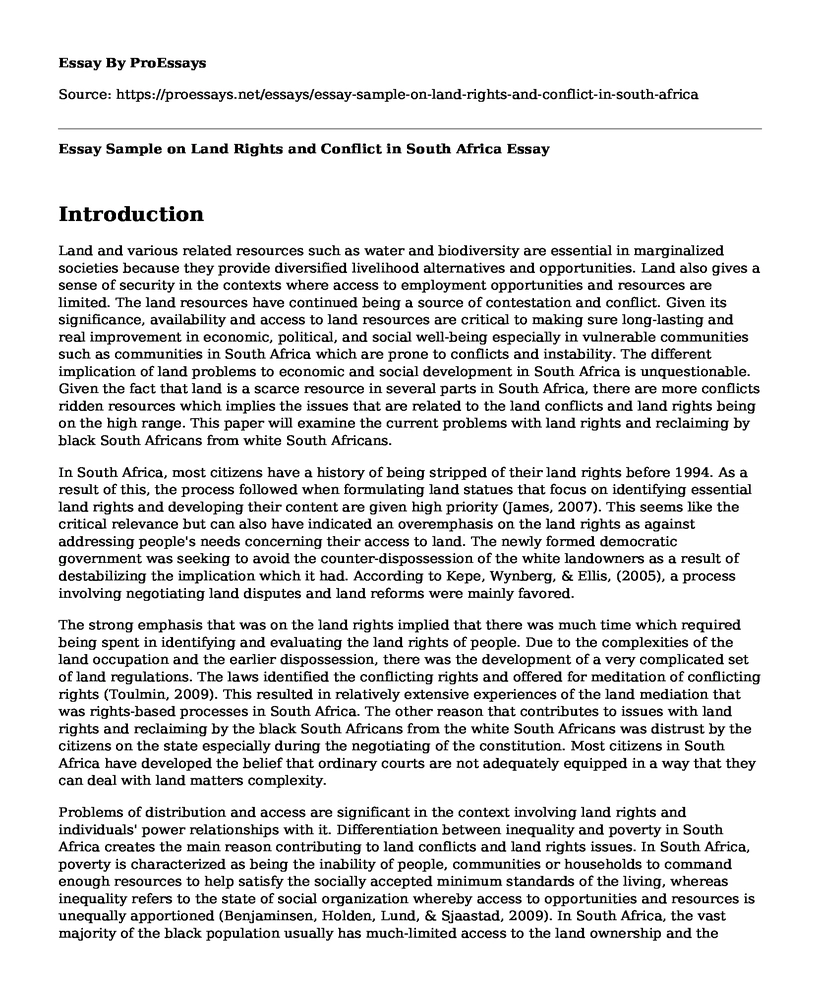Introduction
Land and various related resources such as water and biodiversity are essential in marginalized societies because they provide diversified livelihood alternatives and opportunities. Land also gives a sense of security in the contexts where access to employment opportunities and resources are limited. The land resources have continued being a source of contestation and conflict. Given its significance, availability and access to land resources are critical to making sure long-lasting and real improvement in economic, political, and social well-being especially in vulnerable communities such as communities in South Africa which are prone to conflicts and instability. The different implication of land problems to economic and social development in South Africa is unquestionable. Given the fact that land is a scarce resource in several parts in South Africa, there are more conflicts ridden resources which implies the issues that are related to the land conflicts and land rights being on the high range. This paper will examine the current problems with land rights and reclaiming by black South Africans from white South Africans.
In South Africa, most citizens have a history of being stripped of their land rights before 1994. As a result of this, the process followed when formulating land statues that focus on identifying essential land rights and developing their content are given high priority (James, 2007). This seems like the critical relevance but can also have indicated an overemphasis on the land rights as against addressing people's needs concerning their access to land. The newly formed democratic government was seeking to avoid the counter-dispossession of the white landowners as a result of destabilizing the implication which it had. According to Kepe, Wynberg, & Ellis, (2005), a process involving negotiating land disputes and land reforms were mainly favored.
The strong emphasis that was on the land rights implied that there was much time which required being spent in identifying and evaluating the land rights of people. Due to the complexities of the land occupation and the earlier dispossession, there was the development of a very complicated set of land regulations. The laws identified the conflicting rights and offered for meditation of conflicting rights (Toulmin, 2009). This resulted in relatively extensive experiences of the land mediation that was rights-based processes in South Africa. The other reason that contributes to issues with land rights and reclaiming by the black South Africans from the white South Africans was distrust by the citizens on the state especially during the negotiating of the constitution. Most citizens in South Africa have developed the belief that ordinary courts are not adequately equipped in a way that they can deal with land matters complexity.
Problems of distribution and access are significant in the context involving land rights and individuals' power relationships with it. Differentiation between inequality and poverty in South Africa creates the main reason contributing to land conflicts and land rights issues. In South Africa, poverty is characterized as being the inability of people, communities or households to command enough resources to help satisfy the socially accepted minimum standards of the living, whereas inequality refers to the state of social organization whereby access to opportunities and resources is unequally apportioned (Benjaminsen, Holden, Lund, & Sjaastad, 2009). In South Africa, the vast majority of the black population usually has much-limited access to the land ownership and the associated natural resources which result in increased vulnerability levels and the resultant conflicts over the land.
References
Benjaminsen, T. A., Holden, S., Lund, C., & Sjaastad, E. (2009). Formalization of land rights: Some empirical evidence from Mali, Niger, and South Africa. Land use policy, 26(1), 28-35. https://doi.org/10.1016/j.landusepol.2008.07.003
James, D. (2007). Gaining Ground?: Rights and Property in South African Land Reform. Routledge-Cavendish.
Kepe, T., Wynberg, R., & Ellis, W. (2005). Land reform and biodiversity conservation in South Africa: complementary or in conflict?. The International Journal of Biodiversity Science and Management, 1(1), 3-16. https://doi.org/10.1080/17451590509618075
Toulmin, C. (2009). Securing land and property rights in sub-Saharan Africa: the role of local institutions. Land use policy, 26(1), 10-19. https://doi.org/10.1016/j.landusepol.2008.07.006
Cite this page
Essay Sample on Land Rights and Conflict in South Africa. (2022, Nov 26). Retrieved from https://proessays.net/essays/essay-sample-on-land-rights-and-conflict-in-south-africa
If you are the original author of this essay and no longer wish to have it published on the ProEssays website, please click below to request its removal:
- Problems in Our Criminal Justice System Case Study
- High Cost of Health Care Essay
- Essay on the Complex and Expensive Presidential Nomination Process in the US
- Essay Example on US Financial Markets: Size, Value & Trading Volumes
- Females in Imperial China: Learning & Limitations in Ancient Times - Essay Sample
- Paper Example on Randolph Township: A Historic Town in Massachusetts
- Essay Sample on Juvenile Court System: Failing to Rehabilitate Youth & Provide 2nd Chance







